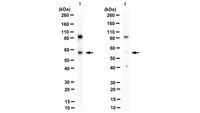MABC186-I Sigma-AldrichAnti-phospho-p62 (Ser403) Antibody, clone 4F6
Detect p62/SQSTM1 (Ser403) using this rat monoclonal Anti-phospho-p62 (Ser403) antibody, clone 4F6, Cat. No. MABC186-I. Validated for use in Immunohistochemistry and Western Blotting.
More>> Detect p62/SQSTM1 (Ser403) using this rat monoclonal Anti-phospho-p62 (Ser403) antibody, clone 4F6, Cat. No. MABC186-I. Validated for use in Immunohistochemistry and Western Blotting. Less<<Recommended Products
Overview
| Replacement Information |
|---|
Key Spec Table
| Species Reactivity | Key Applications | Host | Format | Antibody Type |
|---|---|---|---|---|
| M, H | WB, IHC | R | Purified | Monoclonal Antibody |
| References |
|---|
| Product Information | |
|---|---|
| Format | Purified |
| Presentation | Purified rat monoclonal antibody IgG2a in buffer containing 0.1 M Tris-Glycine (pH 7.4), 150 mM NaCl with 0.05% sodium azide. |
| Quality Level | MQ100 |
| Physicochemical Information |
|---|
| Dimensions |
|---|
| Materials Information |
|---|
| Toxicological Information |
|---|
| Safety Information according to GHS |
|---|
| Safety Information |
|---|
| Storage and Shipping Information | |
|---|---|
| Storage Conditions | Stable for 1 year at 2-8°C from date of receipt. |
| Packaging Information | |
|---|---|
| Material Size | 100 μg |
| Transport Information |
|---|
| Supplemental Information |
|---|
| Specifications |
|---|
| Global Trade Item Number | |
|---|---|
| Catalogue Number | GTIN |
| MABC186-I | 04054839155994 |
Documentation
Anti-phospho-p62 (Ser403) Antibody, clone 4F6 MSDS
| Title |
|---|







